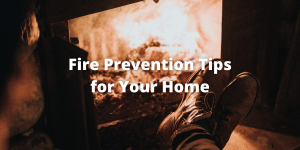Mar 07, 2022
March is Fire Prevention Month in the Philippines, so we’ll share a few safety measures you can use to help prevent a fire in your home…

How often do you check your appliances and outlets? Do you have a spare fire extinguisher at your home? Are you or your loved ones trained on what to do in case of an emergency? It’s always better to be prepared especially during the month of March where frequent fires happen at people’s homes. If we are properly equipped and trained, we will be able to respond to an emergency better and hopefully, without any lives lost. Although for many, they don’t know the importance of being prepared for emergencies until it’s all too late–the fire has burned everything.
Examine your appliances or fixtures at home every week. Look for any abnormalities with electrical appliances and fixtures, such as loose outlets, flickering lights, worn-out switches, or a burning smell when plugging in an appliance.
Using extension cords is a convenient way to connect electrical devices to the wall, but when misused, they can pose fire hazards and danger to your personal safety.
Remember to use extension cords that are under the Philippine National Standards which are certified with an Import Commodity Clearance (ICC) or Philippine Standard Quality (PS) sticker. Whenever you use extension cords outside such as setting up Christmas lights, make sure that they have been marked for outdoor use. For information about how to use the cord correctly and how much power it draws, refer to the instruction manual of the extension cord.
You should consider extension cords that can withstand the wattage of the devices you’ll use them with. Its gauge tells you how big the wire is and how much electrical current it can safely conduct. Also, you will need to consider the cord length, as longer cords can’t handle the same amount of current as shorter cords do. If you want to use an extension cord for big appliances, choose thick, round, low-gauge cords; if you want to use it with smaller appliances and electronics, choose thin or flat cords.
Whether you’re living in an apartment, condominium or your home in Metro Manila, it’s a great investment to have a smoke detector placed inside your space. When a smoke detector detects smoke, it will emit a sound even if you aren’t in the room and alert you to a potential fire allowing you to address the fire as soon as it happens.
During the early stages of a fire, fire extinguishers act as the first line of defense. Since cooking fires are the most common fires in the domestic environment, a 1kg wet chemical fire extinguisher is recommended as it can put out Class A (wood, paper and other solids) and Class F (cooking oil) fires. For more versatility, AllHome also suggests having a 1kg dry powder fire extinguisher for Class A, Class B (flammable liquids), Class C (flammable gases like LPG), Class D (metals) and fires caused by electrical equipment. In the event that your fire extinguisher cannot put out the fire, it would only mean that the fire is too large to extinguish. You should immediately evacuate.
If you plan to use a fire extinguisher, remember the word PASS:
Most condo and apartment buildings have an emergency exit when elevators aren’t working as well as a map to let residents leave the building quickly and without any hassle. Meanwhile, if you have your own home, you should also take note of your home’s exit points and make sure that there aren’t any barricades to it in case of an emergency. Check if windows in your home are rusted or painted shut in case you need to use them as an escape route. Don’t forget to keep a list of emergency contacts such as the National Emergency Hotline, 911, and Bureau of Fire Protection, (02) 8426-0246 or (02) 8426-0219.
Store all important documents in a fireproof safe. In the event of a fire, a fireproof safe will protect your documents, your assets, and your loved ones, relieving you of the burden of scrambling for ways to prove your identity, reinstate your accounts, and get your life back on track.
The best way to prevent rapid or uneven burning, sooting, and excessive dripping from candles is to burn them in a well-ventilated room. You should also place candles in a candle holder and avoid placing candles near furniture, drapes, bedding, carpets, books, or anything else flammable. Make sure that the candles are 4 inches apart, so that they do not melt each other or create drafts that will make the candles burn improperly. For a power outage, AllHome recommends using flashlights and other battery-powered lights because they are safer than candles.
There are rare cases of exploding LPG tanks as well as fire originating from an unattended appliance. Keeping an eye on these fire hazards allow you to immediately spot if something is wrong in order to address the problem quickly and prevent further damage as gas leaks, surging appliances or overheating electronics can cause a large fire that’s hard to put out when left unattended.
Preventing fires in your home is as simple as checking appliances, fire alarms, and finding out what to do in an emergency situation. There’s no best time to prepare for a fire because a fire can occur at any time of the year and anywhere, from electrical wiring to an unattended candle. Protect your loved ones and also yourself, so you will be able to respond well should a fire happen at home even if it’s not during March.
Visit an AllHome store near you or shop at the AllHome online shopping site for everything that you need to keep your home safe. You may also follow us on our official Facebook page, Instagram account and YouTube channel to get updates on the latest news.
Customer Service Hotline: +63 968-2434-789